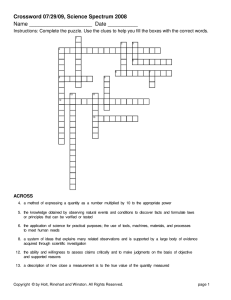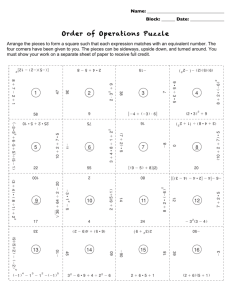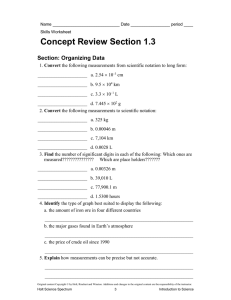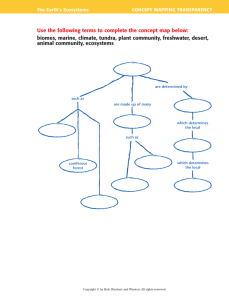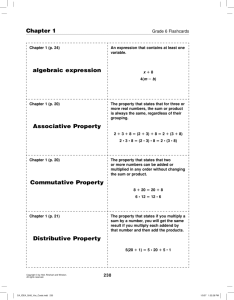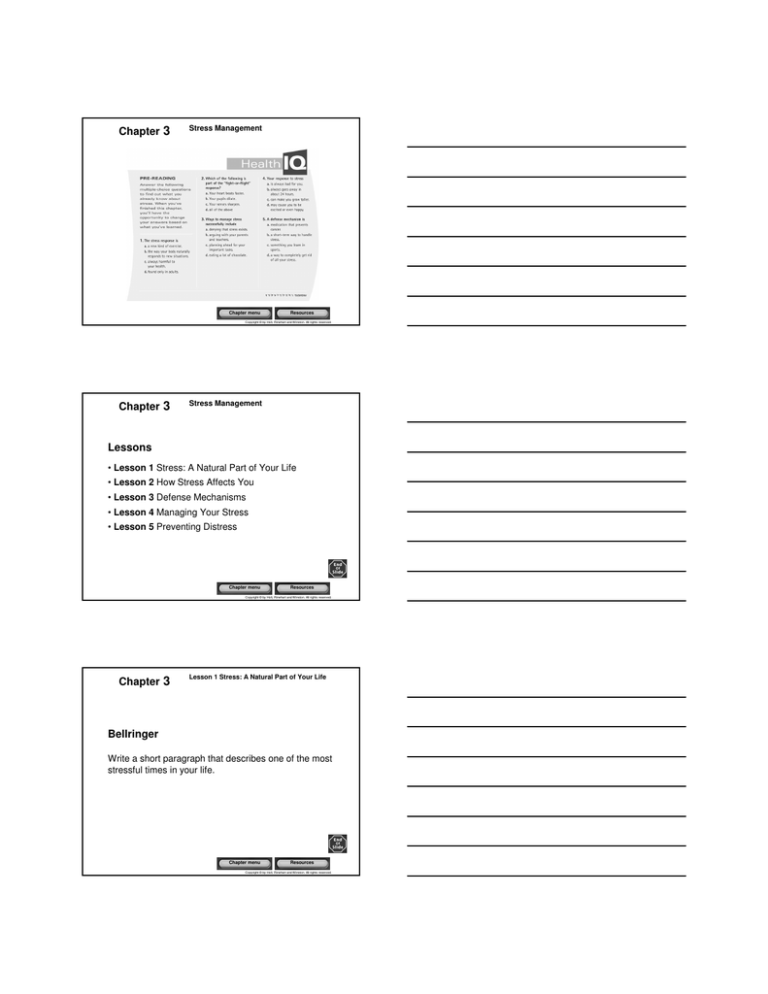
Chapter 3
Stress Management
Chapter menu
Resources
Copyright © by Holt, Rinehart and Winston. All rights reserved.
Chapter 3
Stress Management
Lessons
• Lesson 1 Stress: A Natural Part of Your Life
• Lesson 2 How Stress Affects You
• Lesson 3 Defense Mechanisms
• Lesson 4 Managing Your Stress
• Lesson 5 Preventing Distress
Chapter menu
Resources
Copyright © by Holt, Rinehart and Winston. All rights reserved.
Chapter 3
Lesson 1 Stress: A Natural Part of Your Life
Bellringer
Write a short paragraph that describes one of the most
stressful times in your life.
Chapter menu
Resources
Copyright © by Holt, Rinehart and Winston. All rights reserved.
Chapter 3
Lesson 1 Stress: A Natural Part of Your Life
Objectives
•
Describe the relationship between stress and
stressors.
•
Distinguish between distress and positive stress.
Chapter menu
Resources
Copyright © by Holt, Rinehart and Winston. All rights reserved.
Chapter 3
Lesson 1 Stress: A Natural Part of Your Life
Start Off Write
Why is some stress in your life good for you?
Chapter menu
Resources
Copyright © by Holt, Rinehart and Winston. All rights reserved.
Chapter 3
Lesson 1 Stress: A Natural Part of Your Life
What Is Stress?
•
A Natural Body Response Stress is the
combination of a new or possibly threatening
situation and your body’s natural response to the
situation.
•
What Is a Stressor? A stressor is anything that
causes a stress response. Stressors can be
physical, such as an emergency operation to
remove your appendix. Stressors can also be
mental, emotional, or social.
Chapter menu
Resources
Copyright © by Holt, Rinehart and Winston. All rights reserved.
Chapter 3
Lesson 1 Stress: A Natural Part of Your Life
Bad Stress and Good Stress
•
Distress Distress is the negative physical, mental,
or emotional strain in response to a stressor.
•
Eustress Positive stress—sometimes called
eustress—is the stress response that happens
when winning, succeeding, and achieving.
Chapter menu
Resources
Copyright © by Holt, Rinehart and Winston. All rights reserved.
Chapter 3
Lesson 1 Stress: A Natural Part of Your Life
Major events, such as being in a car accident, can
also cause distress.
Chapter menu
Resources
Copyright © by Holt, Rinehart and Winston. All rights reserved.
Chapter 3
Lesson 1 Stress: A Natural Part of Your Life
Stressors in Your Life
•
Different People, Different Responses Not
everybody feels stressed by the same event.
People respond differently to the same stressor.
•
Balancing Stress You should find stressors—and
a level of stress response—that leave you feeling
motivated and enthusiastic.
Chapter menu
Resources
Copyright © by Holt, Rinehart and Winston. All rights reserved.
Chapter 3
Lesson 1 Stress: A Natural Part of Your Life
Stress—and stressors—can be physical, mental,
emotional, or social.
Chapter menu
Resources
Copyright © by Holt, Rinehart and Winston. All rights reserved.
Chapter 3
Lesson 1 Stress: A Natural Part of Your Life
Stressors Never Come One at a Time
•
Everyday Stressors Every day, you deal with
stressors you have faced many times, such as
quizzes, disagreements with friends, and worrying
about how you look. Most of the time, you deal with
these routine stressors.
•
Major Life Events If a major life event, such as the
death of a favorite grandparent, is suddenly added,
your stress level may change quickly.
Chapter menu
Resources
Copyright © by Holt, Rinehart and Winston. All rights reserved.
Chapter 3
Lesson 1 Stress: A Natural Part of Your Life
All routine stressors may become major problems,
and even small stressors may seem beyond your
control.
Chapter menu
Resources
Copyright © by Holt, Rinehart and Winston. All rights reserved.
Chapter 3
Lesson 2 How Stress Affects You
Bellringer
Describe a situation in which you felt a strong positive
stress. Then, describe how you felt when the stress
was gone.
Chapter menu
Resources
Copyright © by Holt, Rinehart and Winston. All rights reserved.
Chapter 3
Lesson 2 How Stress Affects You
Objectives
•
Describe the body’s stress response.
•
Discuss how stress may affect relationships.
Chapter menu
Resources
Copyright © by Holt, Rinehart and Winston. All rights reserved.
Chapter 3
Lesson 2 How Stress Affects You
Start Off Write
How might long-term responses to stress damage
relationships?
Chapter menu
Resources
Copyright © by Holt, Rinehart and Winston. All rights reserved.
Chapter 3
Lesson 2 How Stress Affects You
Responding to Stressors
•
What Is a Stress Response? A stress response,
also called a “fight-or-flight” response, is your
body’s reaction to a stressor.
•
Physical Changes and Stress Your body
responds to stress with the physical changes
shown on the next slide. These changes are an
immediate and unconscious physical response to
the stressor.
Chapter menu
Resources
Copyright © by Holt, Rinehart and Winston. All rights reserved.
Chapter 3
Lesson 2 How Stress Affects You
Chapter menu
Resources
Copyright © by Holt, Rinehart and Winston. All rights reserved.
Chapter 3
Lesson 2 How Stress Affects You
Short-Term Responses To Stress
•
Short-Term Symptoms of Stress Short-term
responses to stress include:
1. Dry mouth
2. Tightened muscles
3. Extra energy
4. Sharpened vision and hearing
Chapter menu
Resources
Copyright © by Holt, Rinehart and Winston. All rights reserved.
Chapter 3
Lesson 2 How Stress Affects You
Lasting Effects of Stress
•
Long-Term Symptoms of Stress When you are
distressed continuously, you may have:
1. physical, emotional, and mental fatigue
2. difficulty sleeping or frequent headaches
3. mental or emotional problems
4. become depressed, bored, or frustrated
5. feel tense, irritable, and overwhelmed
6. have trouble concentrating
7. overeat without meaning to or lose your appetite
Chapter menu
Resources
Copyright © by Holt, Rinehart and Winston. All rights reserved.
Chapter 3
Lesson 2 How Stress Affects You
Prolonged distress can be serious.
Chapter
Chaptermenu
menu
Resources
Resources
Copyright
Copyright©©bybyHolt,
Holt,Rinehart
Rinehartand
andWinston.
Winston.AllAllrights
rightsreserved.
reserved.
Chapter 3
Lesson 2 How Stress Affects You
Distress Affects Relationships
•
Making Bad Decisions Your distress may hurt
your ability to think clearly and to make good
decisions. Your bad decisions may hurt other
people even if you do not mean to.
•
Dealing with Stress Learn what your stressors
are. Know when you are stressed. Then, you can
deal with your stress and will cause less damage to
your relationships.
Chapter menu
Resources
Copyright © by Holt, Rinehart and Winston. All rights reserved.
Chapter 3
Lesson 3 Defense Mechanisms
Bellringer
Draw a picture of what you think of when you hear the
term defense mechanism.
Chapter menu
Resources
Copyright © by Holt, Rinehart and Winston. All rights reserved.
Chapter 3
Lesson 3 Defense Mechanisms
Objectives
•
Describe the purpose of defense mechanisms.
•
Identify three defense mechanisms.
•
Explain why defense mechanisms may be harmful.
Chapter menu
Resources
Copyright © by Holt, Rinehart and Winston. All rights reserved.
Chapter 3
Lesson 3 Defense Mechanisms
Start Off Write
What do defense mechanisms defend against?
Chapter menu
Resources
Copyright © by Holt, Rinehart and Winston. All rights reserved.
Chapter 3
Lesson 3 Defense Mechanisms
Short-Term Ways of Handling Stress
•
Some Defense Mechanisms Defense
mechanisms include:
1. Rationalization
2. Displacement
3. Repression
4. Denial
5. Projection
Chapter menu
Resources
Copyright © by Holt, Rinehart and Winston. All rights reserved.
Chapter 3
Lesson 3 Defense Mechanisms
Chapter menu
Resources
Copyright © by Holt, Rinehart and Winston. All rights reserved.
Chapter 3
Lesson 3 Defense Mechanisms
Do Defense Mechanisms Help?
•
Short-Term Relief Defense mechanisms are
temporary. They are the easy way out. Defense
mechanisms delay having to deal with the stressor.
•
Defense Mechanisms Do Not Solve Problems
Defense mechanisms do not make the stressor go
away. The stressor is still there. Often, it becomes
even worse, so it is important to realize when you
are using defense mechanisms.
Chapter menu
Resources
Copyright © by Holt, Rinehart and Winston. All rights reserved.
Chapter 3
Lesson 4 Managing Your Stress
Bellringer
Write a paragraph that explains the relationships
among facing a threatening situation, recognizing your
signs of distress, and taking control of the situation to
reduce your stress.
Chapter menu
Resources
Copyright © by Holt, Rinehart and Winston. All rights reserved.
Chapter 3
Lesson 4 Managing Your Stress
Objectives
•
Identify eight physical signs of stress.
•
Identify eight mental or emotional signs of stress.
•
Discuss three tools for managing stress.
•
Discuss why sharing emotions can help relieve
stress.
Chapter menu
Resources
Copyright © by Holt, Rinehart and Winston. All rights reserved.
Chapter 3
Lesson 4 Managing Your Stress
Start Off Write
How do you know when you are stressed?
Chapter menu
Resources
Copyright © by Holt, Rinehart and Winston. All rights reserved.
Chapter 3
Lesson 4 Managing Your Stress
Recognizing Stress
•
What Is Stress Management? Managing stress is
part of mental and physical health. Stress
management is the ability to handle stress in
healthy ways.
•
First Step to Stress Management The first step to
managing stress is recognizing that you are
stressed.
Chapter menu
Resources
Copyright © by Holt, Rinehart and Winston. All rights reserved.
Chapter 3
Lesson 4 Managing Your Stress
Stress—even positive stress—produces warning
signs.
Chapter menu
Resources
Copyright © by Holt, Rinehart and Winston. All rights reserved.
Chapter 3
Lesson 4 Managing Your Stress
Handling Distress
•
Stress Management Tools Ways to manage
distress include the following:
1. Asserting yourself
2. Planning ahead
3. Laughing
Chapter menu
Resources
Copyright © by Holt, Rinehart and Winston. All rights reserved.
Chapter 3
Lesson 4 Managing Your Stress
Sharing Emotions
•
What Are Emotions? Emotions are the feelings
produced as you respond to something in your life.
•
Talk About How You Feel Wanting to share your
emotions with other people is natural. Often, just
talking about your problem will help you solve it.
Talk to a grownup you can trust—a parent, relative,
teacher, religious leader, or guidance counselor.
Chapter menu
Resources
Copyright © by Holt, Rinehart and Winston. All rights reserved.
Chapter 3
Lesson 4 Managing Your Stress
Sometimes, just talking
about a stressor makes
the stressor seem less
stressful.
Chapter menu
Resources
Copyright © by Holt, Rinehart and Winston. All rights reserved.
Chapter 3
Lesson 4 Managing Your Stress
Taking Time for Yourself
•
Personal Time Personal time lets you forget all
your stressors for a little while. It is time when you
can relax.
•
Planning Personal Time Plan all the things that
you must do during the day and find 30 minutes of
time where you can do something just for yourself.
Chapter menu
Resources
Copyright © by Holt, Rinehart and Winston. All rights reserved.

